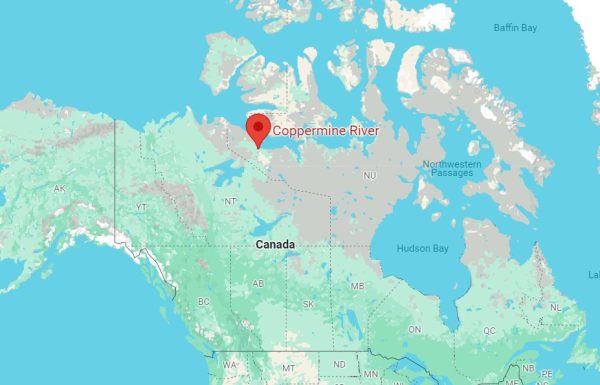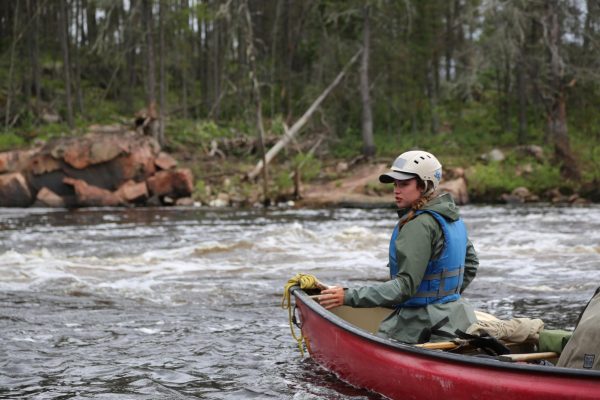Bear spray. Whitewater helmets. Blocks of American cheese. The Arctic demands it all.
Senior Carys Hardy will head to the Arctic Circle this summer to canoe for 42 days deep in the Canadian wilderness.
But this is nothing new; Hardy has been heading north to paddle her whole life.
“My parents have been taking me to the Boundary Waters since I was three—like very, very little. It’s been an important part of my growing up. I spent a lot of time hiking around in the woods and in canoes,” Hardy said.
Hardy’s love for paddling pristine waters continued into her pre-teenhood when she started attending YMCA Camp Menogyn. Menogyn is a wilderness expedition camp that gave Hardy a deep connection with herself, her trip-mates, and the natural world.
“I get a sense of belonging and connection that I don’t get in the frontcountry. I feel connected to myself and the people I’m traveling with,” Hardy said.
In her most recent trip with Menogyn, Hardy paddled the Bloodvein River in Canada. This summer, Hardy will head somewhere even more remote; Mengoyn usually sends trips to the Thelon and Coppermine rivers in the Canadian Northwest and Nunavut territories.

Image from Google Maps.
“It’s in the general area of Hudson Bay—but a little different so we are out of polar bear territory,” Hardy said.
These rivers reside in the sparsely populated arctic tundra, a treeless biome covered in short shrubbery and mosses. The sun never quite sets during arctic summers. Living without clocks, paddlers can get day and night confused.
During the 42 days, Hardy and her groupmates will whitewater paddle, portage their canoes, and likely develop deep bonds. Hardy describes these weeks in the wilderness as being “on trail.” But, what does that mean?
“We are living self-supported in the wilderness. We will have packed all our own food and gear. We won’t have any access to the internet or cellphones or indoor spaces at all. We’re pretty much doing everything ourselves,” she said.
Hardy finds beauty and serenity in the isolation of her Menogyn trips. In such remote places, she encounters natural wonders that can be hard to find in a fast-paced life in the city.
“There’s nothing more magical than turning around a corner on a river and all of sudden there’s a rock with a hundred pelicans and they all fly up at once,” she said, “I usually feel way more awake when I am on trail.”
While the beauty of the wilderness is reason enough for Hardy, her time on trail also benefits her time off.
“When I am on trail I’m much more present and in the moment. It’s something I try to carry over to my everyday life. When you come off trail you become more grateful for things that a lot of people don’t think twice about,” she said.
Menogyn expeditions into the wilderness mean a lot to Hardy, so much that she worked four jobs this summer to make her upcoming trip to the Arctic possible.
“I was lucky enough to have my family help pay for my previous camp trips but they kinda drew the line at the very expensive Arctic trip,” she said.
Working 40-60 hours a week, Hardy has made her own money for the trip in a variety of ways: teaching swim lessons, babysitting, lifeguarding, nannying, and rolling her dad’s loose change.
“I wanted the Arctic trip to be an option for me,” she said.

Image submitted by Carys Hardy.
Now that she knows she will be able to go, Hardy is getting excited.
“I’m excited to be somewhere remote…the group that went last year didn’t see anyone else,” she said, “And I’m excited to see musk ox.”
The nerves are there too.
“Most trips have a whitewater incident that could’ve ended badly and doesn’t. I am going to be very far from help. And it’s scary to go with a group of people I’ve never met before. It’s scary but I’m excited,” Hardy said.
Hardy will head to the remote corners of Canada in early summer for her 42-day canoe trip.